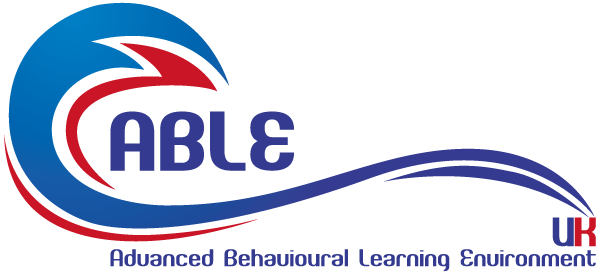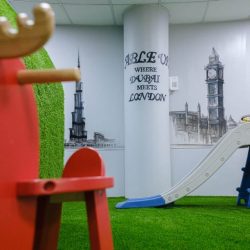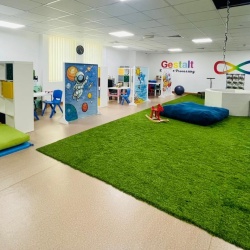- About Us
- Our Services
- Our Team
- Training & Events
- Gallery
- Blog
- Contact Us
At ABLE UK, our Speech-Language Therapists provide the evaluations assessments and
treatments for children and adolescents within the framework of OPT and Prompt.
We help clients learn to communicate with greater ease and proficiency. We always
emphasize the most current and adaptive strategies, employed by a diverse team of caring, certified speech pathologists. We serve culturally and linguistically diverse populations, and make both bilingual and monolingual Arabic and English, interventions available.
We provide assessment and treatment for children and adolescents with;
- Neurodevelopmental disorders, including Down Syndrome and Autism Spectrum
Disorder - Specific language impairment
- Language/literacy difficulties
- Speech and sound disorders
- Feeding and swallowing
- Cleft lip and palate
- Stuttering and cluttering
- Gestalt Language Processing
- Cerebral Palsy
- Genetic, chromosomal, and metabolic disorders/syndrome
- Childhood Apraxia of Speech
- Complex Communication Needs/AAC
- Pragmatic Language Disorder
- Developmental Delay
- Fluency Disorders
- Receptive/Expressive Language Impairment
We work collaboratively as a team with parents and caregivers, and we’re available
for consultations with other professionals who work with your child. We have a
proven success rate in facilitating effective communication in kids.
It is our belief that many late talkers maybe experiencing underlying orofacial myofunctional disorders which result in difficulty with sequencing and coordination of the mouth muscles and are misdiagnosed as expressive language delay or disorder.
Each child receives a treatment plan, a 3-month progress summary, and a treatment
summary at the end of the year or upon graduation from therapy.
Our Speech Therapists are experienced and skilled in the following programs;
- Oral-Motor therapy to Improve Oral Phrase of Feeding
- Elimination of Sucking Habits:
- Pacifier, thumb, fingers, nail biting.
- Complex Articulation/Phonological Processing Impairment.
- Remediation of Tough and Lingering Speech Sounds:
R, S, L, SH, CH - Phonological/ Phonemic Processing.
- Sensory Processing Disorders.
- Prompt approach.
- Hanen it talks 2 to talk program.
- Beckmans Approach.
- Social Thinking.
- AAC and other methods.
- Talk Tools Level 1,2,and 3.
- Talk Tools Kaleidoscope Model of feeding.
- Feed the Paeds.
- DIR Floortime.
Beckmans Oral Motor Protocol And Intervention
Beckman Oral Motor Protocol is an intervention that utilizes assisted movement and stretch reflexes to activate muscle contraction, build strength and improve Range of Motion in the lips, jaw, tongue and soft palate. It is highly beneficial for children that cannot follow verbal commands due to motor planning and or cognitive deficits. This intervention can be used with infants as well.
At ABLE UK our Speech Language therapists provide the Beckman Oral Motor Assessment and Intervention. Throughout their work with the children, our therapists use the hands-on techniques for tonic bite, slow oral transit, tongue thrust, and gag. The therapists use specific intervention strategies for improving facial muscle function for eating and speech. These techniques are highly effective and help our therapists better serve children with speech and feeding goals.
Prompt THERAPY
What is PROMPT speech therapy? You may have heard this term before but were unsure how it applies to your child’s needs. Prompt stands for Prompts for Restructuring Oral Muscular Phonetic Targets. It is a highly successful therapy option for children with motor speed disorders. This includes children who have childhood apraxia or dysarthria. It may also help some adults who struggle with these needs as well. It is unique and effective as a robust type of speech therapy.
Many children may benefit from the use of PROMPT. This includes individuals who are typically at least six months or older. They may have a diagnosis of a condition such as:
- Apraxia
- Dyspraxia
- Autism
- Cerebral palsy
Treatment for other speech disorders and impairments may also be effective using this method. It is best to use it on those with partial or completely non-verbal children. It may also be an alternative treatment for those with mild articulation delays who have not responded to other types of treatment. It is also suitable for those who have motor speech disorders as well as language disorders.
There are various ways that PROMPT is different from other types of speech therapy. It is a much more hands-on experience designed to improve speech. To work well, our therapists has to use touch cues to help to guide the child. As the child learns and expands their skills, the touch cues are removed, one after the other, allowing the further building of those skills. Unlike other methods that rely on repetition, this method is far more hands-on in its functionality. Our therapists are all PROMPT level 3 trained and we offer the highest quality of therapy to suit the childs needs
Watch our expert therapist guide a child through a TalkTools session, using specialized tools and techniques to enhance oral-motor skills, speech clarity, and feeding abilities. This hands-on approach combines play and therapy to support the child’s unique needs, promoting measurable progress in a fun and engaging environment. Discover the impact of TalkTools in action and how it transforms lives, one step at a time.
Horn #3 in the TalkTools Horn Hierarchy is a foundational tool used in oral-motor therapy to develop lip closure, improve breath control, and strengthen oral musculature. Designed to build the skills necessary for speech clarity and feeding, this horn targets controlled exhalation and encourages the coordination of lips and airflow. By practicing with Horn #3, clients progress toward better muscle tone and the oral-motor stability needed for more advanced speech sounds. It’s an integral step in the sequential approach of the Horn Hierarchy, offering structured and measurable outcomes in therapy.
Food desensitization in Speech and Language Pathology is a therapeutic approach designed to help individuals with sensory aversions or oral-motor challenges gradually tolerate and interact with various textures, tastes, and consistencies of food. This process involves introducing non-threatening exposure to foods through playful activities, sensory exploration, and structured steps tailored to the individual’s comfort level. By addressing sensitivities and reducing anxiety around eating, food desensitization aims to improve feeding skills, promote positive mealtime experiences, and support overall oral-motor development. It is particularly beneficial for individuals with feeding disorders, sensory processing issues, or developmental delays.
The Sensi from TalkTools is a versatile tool used in Speech and Language Therapy to support oral-motor development, sensory integration, and muscle strengthening. Equipped with adjustable vibration settings and interchangeable tips, the Sensi provides targeted tactile input to the oral structures, helping improve awareness, coordination, and tone in the lips, tongue, and cheeks. Ideal for clients with sensory processing challenges, feeding difficulties, or speech delays, the Sensi is used to reduce oral aversions, enhance sensory acceptance, and build the foundational skills necessary for clear speech and effective feeding. It’s a dynamic addition to therapy sessions, offering measurable progress in a fun and engaging way.





